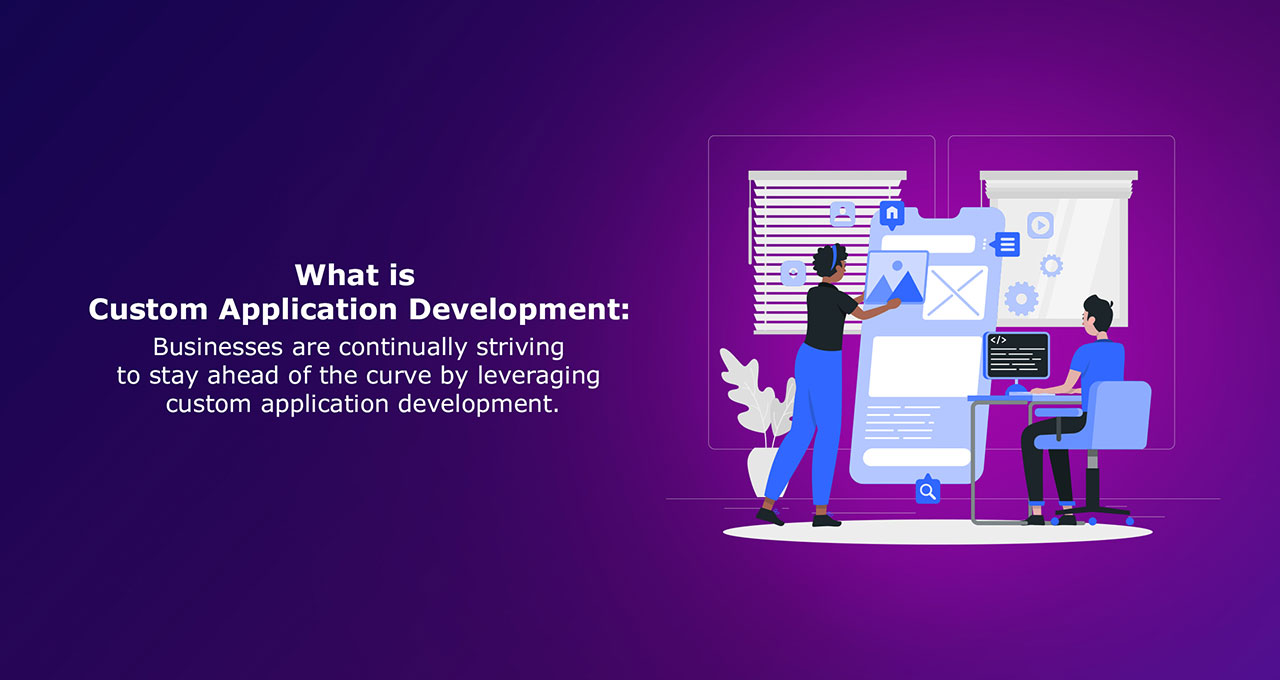
Image Credit: Image by storyset on Freepik
In the fast-paced landscape of technology, businesses are continually striving to stay ahead of the curve by leveraging custom application development. As we step into 2024, the demands on custom application development have evolved significantly, driven by shifting market trends, emerging technologies, and the ever-growing needs of businesses to streamline operations, enhance user experiences, and gain a competitive edge. In this blog post, we delve into the current state of custom application development, exploring its key aspects and the crucial role it plays in empowering businesses in the digital age.
Tailored Solutions for Diverse Business Needs:
Custom application development in 2024 is all about crafting bespoke solutions that precisely cater to the unique requirements of businesses across various industries. Whether it’s developing a customer relationship management (CRM) system tailored to the specific workflows of a healthcare provider or creating a supply chain management application optimized for an e-commerce giant, customization is paramount. This tailored approach ensures that businesses can efficiently address their pain points and capitalize on opportunities in their respective domains.
Agility and Scalability:
In today’s dynamic business environment, agility and scalability are non-negotiable. Custom applications need to be flexible enough to adapt to evolving business needs and scalable to accommodate growing user bases and data volumes. Agile methodologies such as DevOps and continuous integration/continuous deployment (CI/CD) have become integral to the custom application development process, enabling rapid iteration, seamless updates, and efficient collaboration between development and operations teams.
Integration with Emerging Technologies:
The landscape of custom application development is being reshaped by the integration of cutting-edge technologies such as artificial intelligence (AI), machine learning (ML), Internet of Things (IoT), blockchain, and augmented reality (AR)/virtual reality (VR). Businesses are harnessing the power of these technologies to drive innovation, enhance decision-making processes, automate repetitive tasks, and deliver immersive user experiences. Custom applications infused with AI algorithms can analyze vast datasets to derive actionable insights, while IoT-enabled applications can collect real-time data from connected devices to optimize operations.
Security and Compliance:
With the increasing frequency and sophistication of cyber threats, security is a top priority in custom application development. Businesses must ensure that their applications adhere to the highest standards of security and compliance to safeguard sensitive data and mitigate risks. This includes implementing robust authentication mechanisms, encryption protocols, and access controls, as well as adhering to industry-specific regulations such as GDPR, HIPAA, PCI DSS, and SOC 2.
User-Centric Design:
User experience (UX) design is a cornerstone of custom application development in 2024. Applications must not only be functional and efficient but also intuitive and engaging for end-users. User-centric design principles drive the development process, with a focus on understanding user behaviors, preferences, and pain points to deliver seamless and delightful experiences. This involves conducting user research, creating personas, prototyping, and iteratively testing and refining the application based on user feedback.
Cross-Platform Compatibility:
In an era where users access applications across a myriad of devices and platforms, cross-platform compatibility is essential. Custom applications need to be optimized for a seamless experience across desktops, laptops, smartphones, tablets, and other devices, irrespective of the operating system or browser being used. Technologies such as responsive web design, progressive web apps (PWAs), and hybrid mobile app development frameworks facilitate the development of cross-platform applications that deliver consistent performance and usability.
Data Analytics and Insights:
Data is the lifeblood of modern businesses, and custom applications play a pivotal role in capturing, processing, and analyzing data to derive actionable insights. Advanced analytics capabilities embedded within custom applications enable businesses to gain valuable insights into customer behavior, market trends, operational efficiency, and performance metrics. Whether it’s generating interactive dashboards, predictive analytics models, or real-time reports, custom applications empower businesses to make data-driven decisions and drive growth.
Collaboration and Communication Tools:
In the era of remote and hybrid work environments, custom applications that facilitate collaboration and communication are indispensable. From project management platforms and team collaboration tools to virtual meeting solutions and document management systems, businesses rely on custom applications to enable seamless communication and collaboration among distributed teams. These applications integrate features such as instant messaging, video conferencing, file sharing, and task management to enhance productivity and foster teamwork.
In conclusion, custom application development in 2024 is characterized by a relentless focus on delivering tailored solutions that address the evolving needs of businesses in an increasingly digital and interconnected world. By embracing agility, scalability, emerging technologies, security, user-centric design, cross-platform compatibility, data analytics, and collaboration tools, custom applications empower businesses to innovate, optimize operations, and drive sustainable growth in today’s competitive landscape.
Frequently Asked Questions (FAQ) about Custom Application Development
Custom application development refers to the process of creating software applications or solutions tailored to meet the specific needs, requirements, and objectives of a particular business or organization. These applications are designed from scratch or built upon existing platforms, frameworks, or technologies to address unique challenges and opportunities faced by businesses across various industries.
Custom application development is essential because it enables businesses to have complete control over the features, functionalities, and user experience of their software solutions. Unlike off-the-shelf software, custom applications are designed to align perfectly with the workflows, processes, and goals of a specific business, leading to increased efficiency, productivity, and competitive advantage.
Custom application development offers several benefits, including:
- Tailored solutions: Custom applications are designed to address the unique needs and requirements of businesses, resulting in a more efficient and effective solution.
- Scalability: Custom applications can be scaled according to the growth and evolving needs of the business, ensuring long-term viability.
- Integration: Custom applications can seamlessly integrate with existing systems and technologies within the organization, enhancing overall efficiency and productivity.
- Enhanced security: Custom applications can be designed with robust security features to protect sensitive data and mitigate cybersecurity risks.
- Competitive advantage: Custom applications can provide businesses with a competitive edge by enabling them to differentiate themselves in the market and deliver superior experiences to customers and stakeholders.
Custom application development involves creating a software solution from scratch or customizing existing platforms to meet specific business needs, whereas off-the-shelf solutions are pre-built software packages designed to serve a broad range of users with generic features and functionalities. Custom applications offer greater flexibility, control, and customization options compared to off-the-shelf solutions, which may require businesses to adapt their processes and workflows to fit the software.
Custom application development can benefit a wide range of industries, including healthcare, finance, e-commerce, manufacturing, logistics, education, and more. Any business or organization that has unique requirements, workflows, or challenges that cannot be adequately addressed by off-the-shelf software can benefit from custom application development.
The timeline for custom application development varies depending on the complexity of the project, the scope of work, the availability of resources, and other factors. While some custom applications may be developed relatively quickly, others may require more time for thorough planning, design, development, testing, and deployment. It’s essential to work closely with a reputable custom application development provider to establish realistic timelines and milestones for the project.
Custom application development leverages a variety of technologies, programming languages, frameworks, and tools based on the specific requirements of the project. Common technologies used in custom application development include Java, C#, Python, JavaScript, HTML/CSS, SQL, .NET, Angular, React, Node.js, MongoDB, AWS, Azure, and more. The choice of technologies depends on factors such as scalability, performance, security, and integration requirements.
Businesses interested in custom application development can start by identifying their specific needs, requirements, and objectives for the software solution. It’s essential to work closely with a reputable custom application development provider that has the expertise, experience, and resources to deliver tailored solutions that align with the business goals. The development process typically involves requirements gathering, design, development, testing, deployment, and ongoing support and maintenance.

